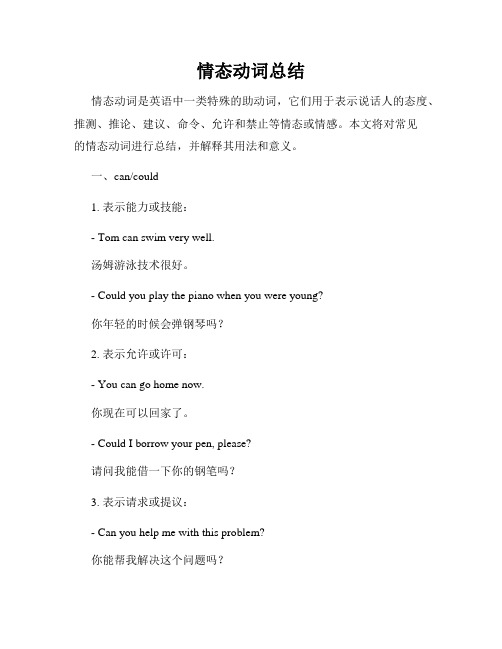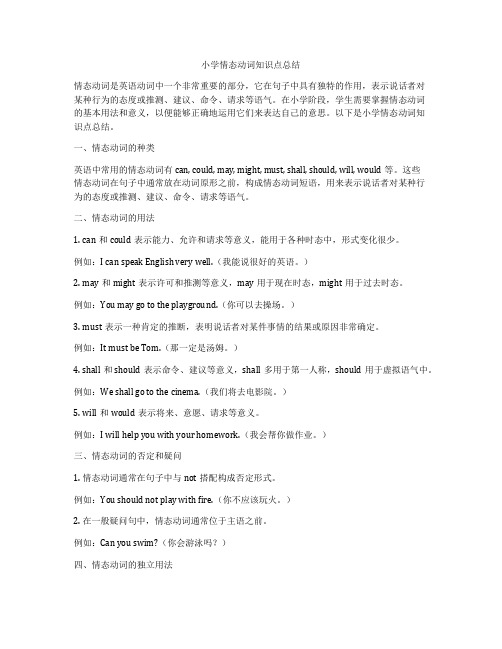情态动词归类大全
情态动词总结

情态动词总结情态动词是英语中一类特殊的助动词,它们用于表示说话人的态度、推测、推论、建议、命令、允许和禁止等情态或情感。
本文将对常见的情态动词进行总结,并解释其用法和意义。
一、can/could1. 表示能力或技能:- Tom can swim very well.汤姆游泳技术很好。
- Could you play the piano when you were young?你年轻的时候会弹钢琴吗?2. 表示允许或许可:- You can go home now.你现在可以回家了。
- Could I borrow your pen, please?请问我能借一下你的钢笔吗?3. 表示请求或提议:- Can you help me with this problem?你能帮我解决这个问题吗?- Could we have lunch together tomorrow?明天我们一起吃午饭好吗?4. 表示推测或猜测:- It can't be true! I don't believe it.这不可能是真的!我不相信。
- They could be at the park. Let's check there.他们可能在公园。
我们去看看吧。
二、may/might1. 表示允许或许可:- May I use your phone?我可以用你的手机吗?- Might I have another piece of cake?我可以再要一块蛋糕吗?2. 表示请求或建议:- May I ask you a question?我可以问你一个问题吗?- You may consider taking a break.你可以考虑休息一下。
3. 表示推测或猜测:- She may be late for the meeting.她可能会迟到开会。
- It might rain tomorrow, so bring an umbrella.明天可能会下雨,所以带把伞吧。
情态动词归类大全

情态动词一:情态动词的用法:常用的情态动词有can,may,must,need,should, had better.1. can 的用法:①表示能力“能,会” eg: He can speak a little Japanese.他会说一点日语。
②表示请求或许可“可以” eg: Can I help you 要我帮忙吗③表示猜测“可能” eg: Where can she go now 她可能到哪里去了呢的用法:①表示请求或允许“可以”“准许” eg: May I go home,please请问我可以回家吗②表示可能性“可能”、也许” eg: I think it may rain this afternoon. 我想今天下午可能下雨。
注:might为may的过去式,但也可以代替may,语气较为婉转客气或更加不肯定。
eg: ① He might not come today.今天他也许不来了。
(语气不肯定)②You might also get a headache when you work too hard,当你工作太努力时,你也可能患头痛3. must的用法:①表示义务、必要或命令“必须、应该” eg: You must come early tomorrow.你明天得早来。
②表示推测时“肯定,一定” eg: They must be at light is on 他们肯定在家,灯亮着呢.③ must not 禁止,不许 eg: You must not tell lies. 你不许撒谎。
注意:①must开头的疑问句,其否定回答通常用 don't have to 或needn't 。
而不用mustn'teg: ---Must I finish my homework first 我必须先完成作业吗---No, you don't have to/ needn't. 不,你不必。
小升初英语总复习情态动词

小升初英语情态动词概述情态动词概述特征1)情态动词(modal verb)本身有词义,表示说话人的语气或情态,但词义不完全,不能单独用作谓语动词,一般只能和动词原形一起构成谓语动词。
2)情态动词所表示的情态有:命令、允诺、请求、拒绝、愿望、愿意、义务、必要、可能、能力、敢于、需要等。
3)情态动词(ought除外)和助动词shall,will,should,would一样,后面的动词不定式一般皆不带。
形式变化1)没有人称和数的变化,第三人称单数的现在时也无变化。
如:I can We canYou can You canHeThey canShe canIt2)有些情态动词有过去式,有少数过去式和它的原形相同。
a)有过去式的情态动词有:may -- wouldcan ―― couldmay―― nightshall -- shouldhave to -- had tob)过去式不变的情态动词有:must - must (或had to)ought to - ought toneed---needdare - dare(亦可用dared)3)大多数情态动词后面可用动词的进行式、完成式和被动形式,如:can(may,must)be doing,can(may,must) have done,can(may,must)be done等。
否定式情态动词和助动词一样,后面可直接跟否定词not。
现将情态动词的否定式及其否定式的简略式(简略式用于口语中)列举如下:shall not--shan't [FB:nt]will not---won't [wEunt]can not-can't [kB:nt]must not-mustn't [5mQsnt]should not-- shouldn'twould not-- wouldn'tcould not-- couldn'tdare not- daren't [dZEnt]need not-- needn't在疑问句中的用法情态动词在疑问句中的用法和助动词相同。
常见的情态动词有

常见的情态动词有情态动词是英语中的一类特殊的动词,用于表示说话人对某种动作、状态或者可能性的态度、推测、能力、请求等。
常见的情态动词包括can、could、may、might、shall、should、will、would、must等。
下面将对这些常见的情态动词进行详细介绍。
1. cancan是一个常见的情态动词,用于表示能力、许可、请求等。
在表示能力时,can常与动词原形连用,如“I can swim.”(我会游泳)。
在表示许可时,can常与动词原形连用,如“You can go now.”(你现在可以走了)。
在表示请求时,can常与主语连用,如“Can you help me?”(你能帮我吗)。
2. couldcould是can的过去式,常用于表示过去的能力、许可、请求等。
在表示过去的能力时,could常与动词原形连用,如“When I was young, I could run very fast.”(当我年轻的时候,我跑得很快)。
在表示过去的许可时,could常与动词原形连用,如“He said we could use his car.”(他说我们可以用他的车)。
在表示过去的请求时,could常与主语连用,如“Could you lend me some money?”(你能借我一些钱吗)。
3. maymay是一个常见的情态动词,用于表示可能性、许可等。
在表示可能性时,may常与动词原形连用,如“It may rain tomorrow.”(明天可能会下雨)。
在表示许可时,may常与动词原形连用,如“May I use your phone?”(我可以用一下你的手机吗)。
4. mightmight是may的过去式,常用于表示过去的可能性、许可等。
在表示过去的可能性时,might常与动词原形连用,如“She thought shemight be late.”(她觉得她可能会迟到)。
在表示过去的许可时,might常与动词原形连用,如“Might I ask you a question?”(我可以问你个问题吗)。
情态动词有哪些

情态动词有哪些2019-05-08 13:53:03文/刘美娟情态动词本身有一定的词义,表示语气的单词。
但是不能独立作谓语,只能和动词原形一起构成谓语。
情态动词用在行为动词前,表示说话人对这一动作或状态的看法或主观设想。
情态动词虽然数量不多,但用途广泛,常用的情态动词有:can (could), may (might), must, need, ought to, dare (dared), shall (should), will (would).1情态动词四大分类①只做情态动词:may, might, must…②可做情态动词又可做实义动词:如:need, dare…③具有情态动词特征:have(had,has) to,used to, ought to④可做情态动词又可作助动词:如:shall(should),will(would) 2情态动词的词法和句法特征1、除ought和used和have to以外,其他情态动词后面只能接不带to的不定式。
如果我们把ought to和used to看做是固定词组的话,那么,所有情态动词无一例外地只能接不带to的不定式:We used to grow beautiful roses.我们过去常常种这种漂亮的玫瑰花I asked if he would come and repair my television set.我问他是否来修我的电视机2、情态助动词在限定动词词组总是位居第一:They need not have been punished so severely.他们不需要如此严厉的惩罚3、情态助动词用于第三人称单数现在式的时候,没有词形变化,即其词尾无-s形式:She dare not say what she thinks.她不敢说她是怎么想的4、情态动词没有非限定形式,即没有不定式和分词形式,也没有相应的动名词:Still,she needn't have run away.不过,她不必跑了5、情态助动词的“时”的形式并不是时间区别的主要标志。
(完整版)情态动词归纳表

情态动词归纳表高考热点透视热点一:表猜测的情态动词的用法。
热点二:情态动词+have done情态动词+have done的用法有两种含义:1. 对过去情况的猜测。
由表猜测的情态动词+have done构成。
上表已经提到。
2. 表示与过去事实的主观设想。
有轻微的责备、后悔之意。
请参看下表:热点三:shall,will,must等1. Shall ①用于第一人称疑问句中表示说话人征求对方的意见或向对方请求。
例:—The room is so dirty. _______ we clean it?—Of course. ( 03 上海春招)A. WillB. ShallC. WouldD. Do②用于第二人称陈述句表示说话人或他人的意图、命令、允诺、警告、命令等。
例:“The interest _______ be divided into five parts, according to the agreement made by both sides,” declared the judge. (04 重庆,24)A. mayB. shouldC. mustD. shall2. Will ①表示意愿或意志。
例:I __________ argue with you.②当主语是物时,则表示“不起作用”。
例:The drawer _________ shut.3. Must 表“必须、一定要”。
例:— Who is the girl standing over there?— Well, if you _______ know, her name is Mabel. (02,天津)A. mayB. canC. mustD. shall。
情态动词归纳

情态动词归纳can:1) 表示现在做某件具体事情的“能力”I can climb this cliff..2) 可泛指现在一般的“能力”He can drive a car.3) 表示将来做某件事情的“能力”。
Can you go shopping tomorrow?4) can表示“可能”多用于否定句和疑问句Where can he be? It can’t be true.5) can’t 在书面语中表示“不可能”6) can 用于肯定陈述句中指逻辑上的“可能性”Mr. Reed is in poor health. He can be ill at any time.7) can + 不定时完成体可表示过去的“可能”He can’t have been hurt.8) 口语中多用can表示“许可”Can I smoke in here?9) 表示给予“许可”Could I use your pen? Yes, of course you can.10) can’t可表示“不许”Can I go out for a minute? No, you can’t.could:1) 肯定句中,could只表示过去的一般“能力”He could play the piano when he was only six.2) 否定句中,无论表示过去的一般“能力”,或者过去做某事的“能力”,都可以用could He couldn’t play the piano when he was at school.He got so dru nk that he couldn’t find the front door.3) 表示现在的“可能”could 比can更婉转She can’t/ couldn’t love him.4) 无论肯定,否定,疑问句,could 都可以表示“可能”If you don’t have a guide, you could lose your way.It couldn’t be true. Could the news be true?5) could+ 不定式完成体可表示过去的可能She could have missed the train.6) could + 不定式完成体可表示本来可能发生却没发生,本来可能完成却没完成的动作I could have reported you.be able to:1) 表示现在做某件具体事情的“能力”2) 可泛指现在一般的“能力”3) 表示将来的“能力”,用will/shall be able toI’ll be able to speak German in another two months.4) 肯定句中,表示过去做某件事的“能力”,可用was/were able to, managed toHe was able to translate the article without a dictionary.5) 否定句中,无论表示过去的一般“能力”,或者过去做某事的“能力”,都可以用was/were able toHe wasn’t able to play the piano when I was at school.He got so drunk that he wasn’t able to find the front door.may:1) 可以表示现在的“可能”,He may be still waiting at the door.2) 可以表示将来的“可能”He may leave tomorrow.3) 不用于疑问句中表“可能”4) may not 在书面语中不被用于表示“不可能”5) 用于肯定陈述句中指事实上的“可能性”Mr. Reed looks pale. He may be ill.6) may+ 不定时完成体/不定时完成进行体可表示过去的“可能”He may have been hurt.She may have been expressing her true feelings at that moment.7) 表“许可”时比can/could较为正式8) 表示给予“许可”Might I trouble you for a light? You may indeed.9) may not 可表示根据一般规定的“不许可”,而非说话人不许可May I use your car for a few days? No, you may not.might:1) 在口气上might比may更婉转,更不肯定,2) 可以表示现在的“可能”,He might not live near the threatre.3) 可以表示将来的“可能”He might leave tomorrow.4) might+ 不定时完成体/不定时完成进行体可表示过去的“可能”She might have missed the train.She might have been expressing her true feelings at that moment.5) might + 不定时完成体可表示本来可能发生却没发生,本来可能完成却没完成的动作You might have finished the work last week.6) 表“许可”时比can/could较为正式will1) will在特定语境中可表示“义务”,常用于第二人称主语,是强化的祈使句You will wait outside the gate. 你必须。
小学情态动词知识点总结

小学情态动词知识点总结情态动词是英语动词中一个非常重要的部分,它在句子中具有独特的作用,表示说话者对某种行为的态度或推测、建议、命令、请求等语气。
在小学阶段,学生需要掌握情态动词的基本用法和意义,以便能够正确地运用它们来表达自己的意思。
以下是小学情态动词知识点总结。
一、情态动词的种类英语中常用的情态动词有can, could, may, might, must, shall, should, will, would等。
这些情态动词在句子中通常放在动词原形之前,构成情态动词短语,用来表示说话者对某种行为的态度或推测、建议、命令、请求等语气。
二、情态动词的用法1. can和could表示能力、允许和请求等意义,能用于各种时态中,形式变化很少。
例如:I can speak English very well.(我能说很好的英语。
)2. may和might表示许可和推测等意义,may用于现在时态,might用于过去时态。
例如:You may go to the playground.(你可以去操场。
)3. must表示一种肯定的推断,表明说话者对某件事情的结果或原因非常确定。
例如:It must be Tom.(那一定是汤姆。
)4. shall和should表示命令、建议等意义,shall多用于第一人称,should用于虚拟语气中。
例如:We shall go to the cinema.(我们将去电影院。
)5. will和would表示将来、意愿、请求等意义。
例如:I will help you with your homework.(我会帮你做作业。
)三、情态动词的否定和疑问1. 情态动词通常在句子中与not搭配构成否定形式。
例如:You should not play with fire.(你不应该玩火。
)2. 在一般疑问句中,情态动词通常位于主语之前。
例如:Can you swim?(你会游泳吗?)四、情态动词的独立用法在一些情况下,情态动词可以独立使用,表示说话者对某种行为的态度或推测、建议、命令、请求等语气。
- 1、下载文档前请自行甄别文档内容的完整性,平台不提供额外的编辑、内容补充、找答案等附加服务。
- 2、"仅部分预览"的文档,不可在线预览部分如存在完整性等问题,可反馈申请退款(可完整预览的文档不适用该条件!)。
- 3、如文档侵犯您的权益,请联系客服反馈,我们会尽快为您处理(人工客服工作时间:9:00-18:30)。
情态动词一:情态动词的用法:常用的情态动词有can,may,must,need,should, had better.1. can 的用法:①表示能力“能,会” eg: He can speak a little Japanese.他会说一点日语。
②表示请求或许可“可以” eg: Can I help you? 要我帮忙吗?③表示猜测“可能” eg: Where can she go now? 她可能到哪里去了呢?2.may 的用法:①表示请求或允许“可以”“准许” eg: May I go home,please?请问我可以回家吗?②表示可能性“可能”、也许” eg: I think it may rain this afternoon. 我想今天下午可能下雨。
注:might为may的过去式,但也可以代替may,语气较为婉转客气或更加不肯定。
eg: ① He might not come today.今天他也许不来了。
(语气不肯定)②You might also get a headache when you work too hard,当你工作太努力时,你也可能患头痛3. must的用法:①表示义务、必要或命令“必须、应该” eg: You must come early tomorrow.你明天得早来。
②表示推测时“肯定,一定” eg: They must be at home.The light is on 他们肯定在家,灯亮着呢.③ must not 禁止,不许 eg: You must not tell lies. 你不许撒谎。
注意:①must开头的疑问句,其否定回答通常用 don't have to 或needn't 。
而不用mustn'teg: ---Must I finish my homework first? 我必须先完成作业吗?---No, you don't have to/ needn't. 不,你不必。
② can 和 must在表推测时,can一般否定句中,而must 常用于肯定句中。
eg: ①It can not be Li Lei 那个人不可能是李磊② It must be Li Lei 那个人肯定是李磊。
4. need 的用法:①情态动词“需要,有必要”一般用于否定句或疑问句中。
eg: You needn't come here this afternoon.你今天下午不必要过来。
②行为动词“需要, 有必要”可以用于各种句式中。
eg: ①You don't need to go now. 你不必现在就走。
② I need to have a rest. 我需要休息一下③ Do we need to finish all the work today? 我们今天需要完成所有的工作吗?③need的用法的助记口诀:实义动词表“需要”,后接名、代、不定式。
need后接动名词,主动形式表被动。
情态动词表“需要”,没有人称数之变。
其后直接加动原,多用疑问与否定。
5.征求许可或给予许可,“我可以···?”用句型“Can/May/Could/Might I...?”其中"Can I...?"属于非正式用法,"May I ...?"属于正式用法。
"Could/Might I...?"的回答通常不用could或might,而用may或can或其他表示客气的词语。
6.肯定句中表推测“可能”:can,could,may,might都可以在肯定句中表“可能”。
其中can的语气最强,可能性最大,其余依次递减。
肯定句中表推测“一定,肯定”用must.7.疑问句中表推测“可能”:用can,could,might,而不能用may. mustn't 不表示推测,而表示禁止。
意义为“禁止,不准”8.否定句中表推测: may not/might not:可能不 can not/could not:不可能eg: ①You may not be right.你也许不对. ② You can not be right.你不可能对.9.以may(表许可或请求)开头的一般疑问句的肯定回答用may,否定回答用mustn't或can't。
10.表示“必须”时,must表示主观看法,have to强调客观需要。
11.ought to和should两者都表示应该,但是ought to比should语气强。
12.would rather与than连用,其结构是:would rather...than...或would...rather than...。
would(rather)和than后面都接动词原形,如果用的动词相同,则than后省去该动词。
would rather...than...的意义为“宁愿···而不是···”eg:I would rather play football than baseball.我宁愿踢足球而不愿打棒球。
13. 情态动词的助记口诀:情态动词两要点:动词原形跟后边没有人称、数之变can 表能力 may许可 must来把责任担(必须)否定回答need换。
need需要 dare敢 should应该 would like 愿(意) have to“不得不”表客观。
14.had better用法的助记口诀:表示“建议”和“忠告”,had better 为最好。
建议某人“最好不···”,要用 had better not do。
2003-2008年河南及全国中考题2003---2008年河南中考题组1.(2005河南)You look tired now ,you stay at home and have a rest .A.had toB.had betterC.would like toD.would rather2.(2005河南)--Must I return the book tomorrow morning ? --No ,you .You keep it for three days .A.mustn't ,mayB.mustn't ,mustC.needn't ,canD.needn't ,must3.(2006河南)--Must I go and do it now ? --No ,you ,We still have two more days .A.shouldn'tB.can'tC.needn'tD.won't4.(2007河南)--I didn't pass the math test.I think I have spent too much time playing computer games recently . --I agree .You play like that any more .A.needn'tB.mustn'tC.may notD.wouldn't5.(08河南)--Our class won the English speaking contest. --Congratulations! You be very proud of it.A. canB. needC. wouldD. must6.(08河南)It seems that it is going to rain. You'd better the window open when you leave the house.A. not leaveB. leaveC. not to leaveD. to leave2003---2008年全国中考题组1.(2003天津)You go and ask Meimei .She know the answer .A.must ,canB.must ,mayC.need ,canD.can, may2.(2003福建福州)--Must I stay at home ,Mum? --No ,you .A.mustn'tB.may notC.can'tD.don't have to3.(2003广东广州)The boy said he had to speak English in class ,but he speak it after class .A.couldB.didn't have toC.mightD.shouldn't4.(2004江苏苏州)Could you tell me if he finish the work on time ?A.couldB.was able toC.is able toD.would be able to5.(2004上海)We keep the new traffic law and learn how to protect ourselves .A.mayB.should c.can D.need6.(2004广东佛山)--What a nice day! We go surfing ? --Good idea !A.ShallB.MustC.canD.Need7.(2004乌鲁木齐)--Tom, don't drive too fast ,you hit the other's cars . --OK ,I won't Mum .A.mustB.needC.mayD.have to8.(2005安徽)You be careful with fire when you have a picnic in the forest .It's too dangerous .A.willB.mustC.canD.may9.(2005江苏南通)You worry about him ,He will get well soon.A.needn'tB.can'tC.mustn'tD.may not10.(2005海南)--I don't mind telling you what I know. --You ,I'm not asking you for it .A.needn'tB.mustn'tC.may notD.can't11.(2005厦门)I'm sorry .I go now ,My father told me on the phone that my mother was ill.A.canB.mayC.have toD.think12.(2005宁波)--Don't forget to come to my birthday party tomorrow . .A.I don'tB.I won'tC.I can'tD.I haven't13.(2006海南)--May I go out and play tennis ,Dad ? --Yes ,but you finish your homework first .A.canB.couldC.mayD.must14.(2006安徽)Although you did well this time ,you look down on(看不起) others .A.had betterB.ought toC.shouldn'tD.wouldn't15.(2006甘肃金昌)--Could you please pass the book on the shelf to me ? -- .A.You are welcomeB.No, I couldn'tC.Certainly .Here you areD.Yes , I could16.(2006湖南常德)--Whose volleyball is this ? --It be Carla's .She never plays volleyball.She dislikes it . A.can't B.may not C.must17.(2006湖南怀化)You stop your car when the traffic light is red . A.must B.may C.can18.(2007北京)--Mary , you speak Chinese? --Yes ,only a little .A.mustB.needC.mayD.can19.(2007四川乐山)--Must I do the work now ? --No ,you .You may do it later .A.can't b.mustn't C.needn't D.shouldn't20.(2007四川南充)This history book be Bob's sister's . His sister is only a baby .A.mustB.mightC.can't21.(2007黑龙江齐齐哈尔)--Xiao Hai ,you step on the grass . --Sorry , I do it again.A.needn't ,won'tB.mustn't ,won'tC.can't ,will22.(2007辽宁十二市)--I can't stop smoking ,doctor , --For your health ,I'm afraid you .A.mayB.needC.have toD.must23.(2007江苏镇江)--May I try on the jeans ? --Yes ,you .A.should B.can C.must D.need24.(2007陕西)--Could I borrow your dictionary ? --Of course you .A.can b.must C.should D.will25.(2007太原)--Must we finish giving out the posters today ?--Yes ,we ,It can't be put off any longer . A.can B.may C.must26.(2007山西临汾)--Bill ,is the pink umbrella Anna's ?--No ,it be hers ,Hers is purple . A.might B.must C.can't27.(2007山西)John ,you needn't do your work today ,you do it tomorrow if you're tired.A.mustB.mayC.can't28.(2007内蒙古赤峰)--It nearly took me an hour to arrive here .I'm very tired .--You be thirsty .Have a drink ,please . A.should B.can C.must D.would29.(08辽宁沈阳)The baby is too young .You give her big pieces of food.A. mayB. mustC. may notD. must not30.(08陕西)--Whose exam paper is it? --It be Li Lei's. He always forgets to write his name on it.A. can'tB. mustC. shouldn'tD. may31.(08福建福州)--Kate, you dance the disco? --Yes, I can. A. may B. can C. must D. need32.(08重庆)--Who's that boy reading in the garden?Is it David? --It be David. I saw him in the classroom just now. A. must B. can't C. may D. should33.(08河北)Thomas, Please be quiet. The others hear very well.A. can'tB. mustn'tC. shouldn'tD. needn't34.(08湖北武汉)--Have you seen my glasses? I find them. --Sorry, I haven't seen them.A. can'tB. shouldn'tC. won'tD.mustn't35.(08四川成都)You stay in bed any longer. Get up to work quickly. A. must B.won't C. can't36.(08江苏苏州)We hope that as many people as possible join us for the charity show(慈善演出)tomorrow. A. need B. can C. must D. should37.(08安徽)--Is Mr Brown driving here? --I'm not sure. He come by train.A. mayB. shallC. needD. must38.(08浙江杭州)Four hundred dollars for a pair of shoes, you be joking!A.may B.can C.need D.must39.(08上海)All the passengers wear seat belts on the plane. A. can B.may C.will D.must40.(08天津)--I can't find Dad. Where is he? --I'm not sure .He be in the study.A. mustB. mayC. needD. will答案: 河南1-6:BCCBDA 全国:1-5:DDBCB 6-10:ACBAA 11-15:CBDCC 16-20:AADCC21-25:BCBAC 26-30:CBCDB 31-35:BBAAC 36-40:BADDB大家都来到荷塘,挖莲藕抓鱼虾,捉泥鳅捡螃蟹,人声鼎沸,笑语欢声,相互谈说着要如何弄出一顿顿可口的美味。
